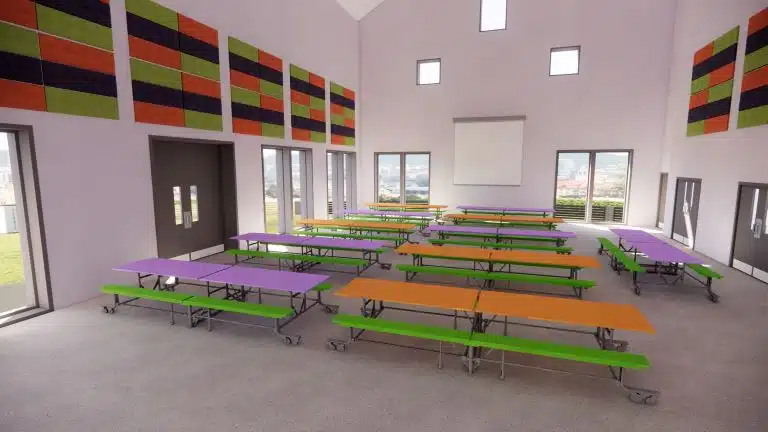Fueling Minds And Fostering Connections: The Significance Of A Nurturing School Dining Experience For Students’ Educational Growth
Jun 22, 2023 • 5 minutes

The school dining experience plays a crucial role in a student’s educational growth. Beyond merely providing sustenance, a nurturing dining environment can positively impact students’ overall well-being and academic performance.
Creating a Nurturing Environment in the School Dining Area
The school dining area should be more than just a place to eat; it should be a nurturing environment that promotes well-being and positive social interactions. A well-designed space with comfortable seating, ample school dining tables, natural light, and pleasant aesthetics can contribute to a sense of belonging and encourage students to enjoy their meals. Furthermore, incorporating elements of nature, such as plants or a courtyard, can create a calming atmosphere and enhance the overall dining experience.
In addition to the physical environment, it is essential to establish a supportive and inclusive culture within the dining area. This can be achieved by implementing a variety of seating arrangements that encourage interaction between students from different grades and backgrounds. By promoting diversity and inclusivity, students can learn from one another, develop social skills, and build lasting connections.
An excellent way to promote inclusivity in the school dining hall is through the use of our Hallmark mobile dining units that can include space for up to 2 wheelchair users per table.
The Role of Social Interaction in a Positive Dining Experience
Social interaction plays a pivotal role in creating a positive dining experience for students. Engaging in conversations with peers, teachers, and other staff members during mealtime can foster a sense of belonging and emotional well-being. Additionally, these interactions provide valuable opportunities for students to develop social skills, such as active listening, empathy, and effective communication. Such skills are vital for their personal and educational growth, as they enable students to form meaningful relationships, collaborate with others, and thrive in various social settings.
To encourage social interaction, schools can implement strategies such as communal dining tables, where students can sit together and engage in conversations. Additionally, organising themed dining events or creating discussion topics related to current events can further stimulate meaningful interactions among students. By fostering a positive dining experience through social interaction, schools can contribute to the overall development of students’ social and emotional skills.
How a Good Dining Experience Contributes to Better Learning in the Classroom
A good dining experience goes beyond the immediate benefits of nutrition and social interaction; it also has a profound impact on students’ learning in the classroom. When students have access to healthy and balanced meals, their cognitive abilities are enhanced, allowing them to focus better, retain information, and perform optimally academically. Proper nutrition provides the necessary fuel for their minds, enabling them to engage actively in the learning process and achieve their full potential.
Furthermore, it can instill healthy habits that extend beyond the school environment. By promoting nutritious food choices and educating students about the importance of a balanced diet, schools can empower students to make healthier choices in their daily lives. This, in turn, leads to improved overall well-being, which positively influences their ability to learn and excel academically.
The Connection Between Nutrition and Educational Performance
The link between nutrition and educational performance is undeniable. Numerous studies have shown that a well-balanced diet, rich in essential nutrients, positively affects cognitive function, memory, attention span, and academic achievement. Conversely, inadequate nutrition can lead to poor concentration, fatigue, and reduced cognitive abilities, hindering students’ educational growth.
To ensure students receive optimal nutrition, schools should strive to provide a variety of healthy food options that cater to individual dietary needs and preferences. This includes offering a range of fruits, vegetables, whole grains, and lean proteins. Additionally, schools can collaborate with nutritionists or dieticians to develop menus that meet the nutritional requirements of students, taking into consideration cultural diversity and food allergies.
Integrating Educational Activities into the Dining Experience
The dining experience can be transformed into a valuable educational opportunity by integrating educational activities into mealtime. This approach not only enhances students’ understanding of nutrition but also provides a platform for exploring various academic subjects and developing essential skills.
For instance, schools can organise cooking workshops where students learn about healthy food preparation and the nutritional value of different ingredients. This hands-on approach not only teaches practical cooking skills but also promotes an appreciation for healthy eating habits. Additionally, educational displays or posters in the dining area can provide information about the nutritional benefits of various foods, encouraging students to make informed choices.
Implementing a Holistic Approach to School Dining
To create a truly nurturing school dining experience, it is essential to adopt a holistic approach that considers various aspects of students’ well-being. This includes providing healthy and balanced meals, fostering social interaction, incorporating educational activities, and creating a supportive and inclusive environment.
Schools can start by collaborating with nutritionists or dieticians to develop menus that meet the nutritional needs of students. By offering a variety of nutritious food options and educating students about the benefits of a balanced diet, schools can promote healthy eating habits and enhance students’ cognitive abilities.
Furthermore, schools should prioritise the design and ambiance of the dining area. Comfortable canteen seating, natural light, and aesthetically pleasing surroundings contribute to a positive dining experience. Our Benchmark tables and Wall Pocket tables not only a provide safe and secure surface for student dining, they can be fully-personalised to create a visually appealing lunchroom aesthetic. Choose from over 140 laminate colours and finishes as well as a range of stool and frame colours or create your own table top design to match your school’s interior. To ensure the long-term benefits of a nurturing school dining experience, it is crucial to actively engage students in the process. This can be achieved through various strategies that encourage students to develop a sense of ownership and responsibility for their dining experience. Call Versa today on 0330 030 0330 to speak to a member of our team and learn how our range of canteen chairs and tables can create a nurturing school dining experience in your educational facility. Our dining tables for schools can be fully-customised to match your specific requirements, providing an environment that promotes your key values.
Create A Nurturing School Dining Experience






